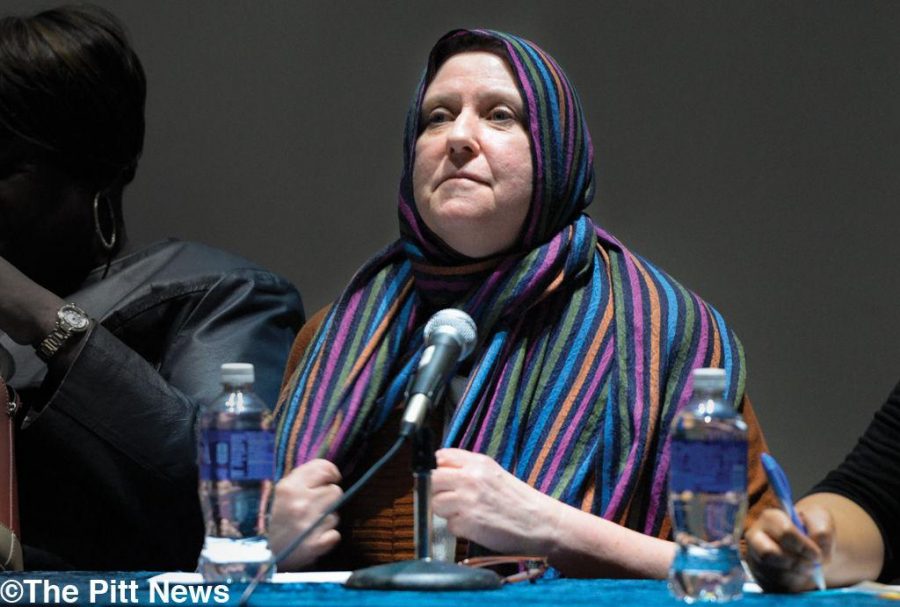Pitt students “Hail to Diversity”
March 24, 2015
When the panel started, Elaine Linn wasn’t wearing a hijab, but, halfway through, she put one on.
Linn, assistant director of academic affairs of the global studies center, is a Muslim American and spoke on a four-person panel that launched Pitt’s Diversity Council in front of about 200 students on Monday night at Frick Fine Arts building.
The council is a coalition of 22 student groups promoting awareness, acceptance and appreciation of diversity on campus. The organizers did not outline how the council will operate at the launch.
The council is forming amidst recent events including nationwide protests against police brutality and the murders of three Muslim students at the University of North Carolina at Chapel Hill.
Linn, a white woman with blue eyes and blond hair, grew up practicing Christianity but converted to Islam in 1983 and later married an Arab man. Her life illustrates the importance of diversity and tolerance, she said.
“I went from being a majority to a minority,” she said as she wrapped a hijab around her head. “Pitt needs to become a more diverse place with your steps. You are the future parents, the business leaders and the educators.”
She cited recent movements in Pittsburgh, such as the Black Lives Matter protests in December — following a New York circuit court’s ruling on the Eric Garner case — and Fight for 15 strikes in Pittsburgh in September, as well as the massive debt facing students as reasons for students to get involved.
“I’m not tenured, but I’m telling you to stand up. We have to make a stir,” Linn said.
All of those who spoke, organizers and panel members, agreed that Pitt could benefit from diversity and a more inclusive student body. According to Pitt’s 2015 factbook, of the 18,575 undergraduate students enrolled on Pitt’s campus last semester, only about 4,400 were non-white.
Julia Johnson, a social justice organizer for We Change Pittsburgh, also spoke on the panel, and gave her personal definition of diversity.
“For me, whenever I think of diversity, I think of the ways we change the human race and the way we add to our growing pool of knowledge,” she said. “It means individuals who are able to express themselves. It’s a very fulfilling way of living. Diversity is everything.”
Even though diverse organizations came together to form the panel, Johnson said, it is important for the groups to keep in mind that all of their causes are equal.
“My cause is important, your cause is important as well. It’s important we don’t dis one another. We have to lift each other up,” she said.
The council, known for now on social media as “Hail to Diversity,” stated its goals on its Facebook page.
“If diversity and inclusion are core values to our university,” its page reads, “they should be a focus of our education — not at the periphery.”
According to Johnson, one of the goals of the council should be accountability.
“There are ways this group can be very strategic to hold this university accountable. This council can build power for one another across movements,” Johnson said.
Ernest Rajakone, senior adviser for Pitt’s South Asian Student Association and brother of Iota Nu Delta, helped form the Diversity Council and organize its launch Monday. The council, he said, will be an open door for students to approach the council with their concerns about diversity on campus.
Rajakone cited the Residence Life photo diversity campaign that met criticism for a lack of inclusivity last semester as one example of a diversity concern. In December, The Pitt News reported that Residence Life removed a poster campaign it created to promote diversity after several students approached the University on behalf of 794 other students who signed a petition calling for its removal on Change.org.
Rather than circulate a petition, Rajakone said, students who disagreed with the campaign could have approached the council with their concerns.
Unlike a similar diversity initiative started in the early 2000s, which was started by the Asian Student Alliance, Black Action Society, Campus Women’s Organization and Rainbow Alliance to redistribute space in the William Pitt Union more fairly, the council will utilize “grassroots” methods, Rajakone said, from within the student body. Rajakone said he expects students to be more receptive to the council’s initiatives because of its student rather than administrative leadership.
Rajakone said there is a need on Pitt’s campus for this initative.
“There’s not much precedent, but we have a vision, and there’s a need,” Rajakone said. “We look at Ferguson and we look at Chapel Hill, and we see a commonality in our struggle, no one is free until everyone is free. This isn’t just in Ferguson and Chapel Hill, this is nationwide.”
University spokesman John Fedele also said he didn’t have details about the earlier initiative but said it likely failed due to a lack of leadership.
While Rajakone said the logistics of the council are still being worked out, he said Monday’s launch was important, “just to show it can be done.”
Just as the council brought together diverse student groups, the representatives from each of the member organizations cited diverse goals and visions for the group.
Claire Matway, a junior and the representative for the Campus Women’s Organization, said her goal for the council was collaboration and empathy.
“I think it’s a huge opportunity for us to be acting in solidarity with one another,” Matway said.
For Joshua Orange, a junior global and urban studies major, the council will “continue to pave the way for civil rights.”
“There is still victory to be had,” Orange said. “We’re all human beings here.”








